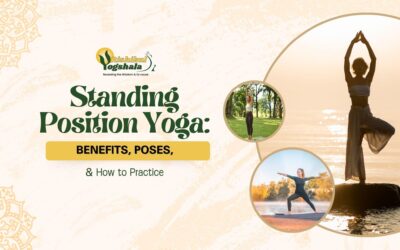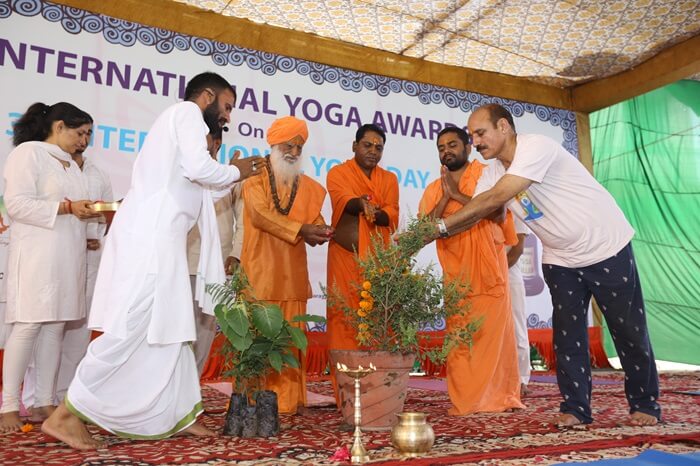The Power of the Sun: Suryanamaskar for Mind, Body, and Soul
The Sun, the epitome of boundless energy, is not only a crucial element of our solar system but also plays a significant role in the human body and mind. Its power is directly linked to the Solar Plexus, or Kundalini Chakra, located behind the navel. Often referred to as the ‘second brain,’ this energy centre is vital for creativity and intuition. By connecting with the Sun through Suryanamaskar, or the Sun Salutation Series, you can activate this energy centre, fostering growth in mind, body, and soul.
Experience the transformative power of Suryanamaskar with these 12 simple steps: Steps to do Surya Namaskar
Step 1: Pranamasana, or the Prayer Pose
Start the series by standing on the legs with feet close to each other. Distribute body weight evenly on both legs. Keep shoulders relaxed and chest expanded. Bring both the palms together in front of the chest in ‘Namaste’ position.
Step 2: Hasta Utthanasana or the Raised Arms Pose

Initial Position: Pranamasana
Inhale and lift the arms upwards forming a curve towards the back with biceps gently grazing the ears. Experience a stretch in the entire body as the arms make an effort to reach the sky. Keep the feet firmly grounded while performing it.
Step 3: Padahastasana or the Hand to Foot Pose

Initial Position: Hasta Utthanasana
Exhale while bending forward from the waist. Keep spine and legs upright, knees very lightly bent. Reach and grab both the ankle with respective hands.
Step 4: Ashwa Sanchalanasana or the Equestrian Pose

Initial Position: Padahastasana
Inhale and push the right leg backwards to touch the edge of the mat – knee shall touch the ground. Bend the left leg as the knee is at perpendicular angle to the ground. Keep the left leg exactly in the middle of both the palms. Look up and exhale.
Step 5: Adho Mukha Shvanasana or the Downward Dog Pose

Initial Position: Ashwa Sanchalanasana
Inhale. Bring both the feet together pushed back while lifting the posterior upwards in an inverted ‘V’ position. Sustain body weight between the palms and the feet. Exhale.
Step 6: Ashtanga Namaskara or Salute with Eight Points Pose

Initial Position: Adho Mukha Shvanasana
Rest the chest, chin and knees on the floor while breathing in. Raise the posterior upwards and exhale.
Step 7: Bhujangasana or the Cobra Pose

Initial Position: Ashtanga Namaskara
Gently move forward to let the body rest on the floor. Inhale as you raise the torso upwards from the waistline. Keep elbows bent and shoulders relaxed. Exhale as you look upwards in the raised position.
Step 8: Adho Mukha Shvanasana or the Downward Dog Pose

Initial Position: Bhujangasana
Inhale. Bring both the feet together pushed back while lifting the posterior upwards in an inverted ‘V’ position. Sustain body weight between the palms and the feet. Exhale.
Step 9: Ashwa Sanchalanasana or the Equestrian Pose
Initial Position: Adho Mukha Shvanasana
Inhale and push the right leg backwards to touch the edge of the mat – knee shall touch the ground. Bend the left leg as the knee is at perpendicular angle to the ground. Keep the left leg exactly in the middle of both the palms. Look up and exhale.
Step 10: Padahastasana or the Hand to Foot Pose

Initial Position: Ashwa Sanchalanasana
Exhale while bending forward from the waist. Keep spine and legs upright, knees very lightly bent. Reach and grab both the ankle with respective hands.
Step 11: Hasta Utthanasana or the Raised Arms Pose

Initial Position: Padahastasana
Inhale and lift the arms upwards forming a curve towards the back with biceps gently grazing the ears. Experience a stretch in the entire body as the arms make an effort to reach the sky. Keep the feet firmly grounded while performing it.
Step 12: Pranamasana or the Prayer Pose
Initial Position: Hasta Utthanasan
Incorporate Suryanamaskar into your morning routine to enhance your life. For a deeper understanding of Suryanamaskar and its benefits, explore our Yoga Teacher Training in India.
Also Read – Top 10 Excellent Benefits of Sun Salutations
Conclusion
Integrating the practice of Suryanamaskar can profoundly impact your overall well-being, invigorating both mind and body while aligning your energy with the Sun’s powerful vibrations. This transformative practice not only enhances physical flexibility and strength but also promotes mental clarity and spiritual growth. To delve deeper into the benefits of Suryanamaskar and explore comprehensive yoga training programs, visit our 200 Hours Yoga Teacher Training In India, or discover rejuvenating retreats such as our Ayurveda Retreat in India and Yoga Retreat in India. Start your journey towards a more balanced and enriched life today!
















